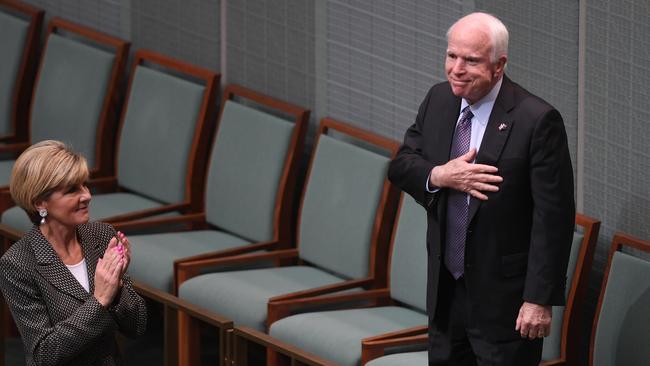John McCain: Australia loses its ally-in-chief
John McCain knew first-hand what our alliance meant — in a deeply personal way.

Australia lost one of its closest friends when US senator John McCain succumbed to aggressive brain cancer yesterday.
A former presidential candidate and six-term senator, a decorated war hero, a fighter pilot and a champion of free trade, the military and veterans, McCain was a titan of a leader.
There was good reason this newspaper labelled McCain our “ally-in-chief”. Not content with being one of the first American legislators to telephone me after the well-publicised phone call between then PM Malcolm Turnbull and US President Donald Trump in January last year, McCain issued a remarkable statement, in turn unleashing a groundswell of goodwill towards Australia among US leaders. The chairman of the Senate’s armed services committee labelled us “one of America’s oldest friends and staunchest allies … united by ties of family and friendship, mutual interests and common values, and shared sacrifice in wartime”.
McCain knew first-hand what our alliance meant — in a deeply personal way. He grew up on stories of Australia. His grandfather sailed here in 1908 with the Great White Fleet and his father commanded a submarine in Perth in World War II. Both forebears went on to the vitally important US Pacific Command post in Hawaii.
As a fighter pilot, McCain enjoyed R&R on our shores, and fought alongside us in Vietnam, as his sons Jack and Jimmy have since done in Afghanistan and Iraq. He embodied camaraderie, leadership and honour, enduring 5½ years as a POW in Vietnam after turning down early release, refusing to go home earlier than his fellow prisoners.
An early visitor to Australia under the Trump administration, it was no surprise that McCain was feted by federal parliament in May last year. During a time when many are unsettled by the debate in America on its place in the world, McCain was a steadfast promoter of the enduring basis of our links, stating: “The animating purpose of our alliance is that we are free societies, founded by immigrants and pioneers, who put our faith in the rule of law, and who believe that our destinies are inseparable from the character of the broader world order.”
He praised Australia’s commitment to “the safer, freer and better world that Australia does far more than its fair share to protect and promote”.
An indomitable voice for American engagement in the Indo-Pacific, McCain opposed the tide of isolationist rhetoric and doggedly pushed for America to remain a principled, active leader.
He argued for a greater military presence in our region at a time we have lobbied for just that in America. And he called on Australians to stick with the US, “to encourage us to stay true to who we are at our best … and to remind us always just how much is at stake”.
McCain’s impact and influence transcended borders, and so too will his legacy. We will miss him dearly; our thoughts are with his family.
Joe Hockey is Australia’s ambassador to the US.



